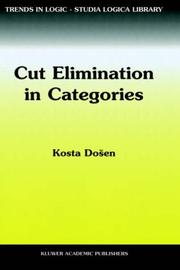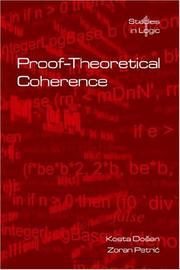| Listing 1 - 3 of 3 |
Sort by
|

ISBN: 0792357205 9048152267 9401712077 Year: 1999 Publisher: Dordrecht Kluwer
Abstract | Keywords | Export | Availability | Bookmark
 Loading...
Loading...Choose an application
- Reference Manager
- EndNote
- RefWorks (Direct export to RefWorks)
Proof theory and category theory were first drawn together by Lambek some 30 years ago but, until now, the most fundamental notions of category theory (as opposed to their embodiments in logic) have not been explained systematically in terms of proof theory. Here it is shown that these notions, in particular the notion of adjunction, can be formulated in such as way as to be characterised by composition elimination. Among the benefits of these composition-free formulations are syntactical and simple model-theoretical, geometrical decision procedures for the commuting of diagrams of arrows. Composition elimination, in the form of Gentzen's cut elimination, takes in categories, and techniques inspired by Gentzen are shown to work even better in a purely categorical context than in logic. An acquaintance with the basic ideas of general proof theory is relied on only for the sake of motivation, however, and the treatment of matters related to categories is also in general self contained. Besides familiar topics, presented in a novel, simple way, the monograph also contains new results. It can be used as an introductory text in categorical proof theory.
Categories (Mathematics) --- Proof theory --- Logic, Symbolic and mathematical --- Category theory (Mathematics) --- Algebra, Homological --- Algebra, Universal --- Group theory --- Topology --- Functor theory --- Proof theory. --- Categories (Mathematics). --- Logic. --- Mathematical logic. --- Category theory (Mathematics). --- Homological algebra. --- Computer science—Mathematics. --- Mathematical Logic and Foundations. --- Category Theory, Homological Algebra. --- Symbolic and Algebraic Manipulation. --- Homological algebra --- Algebra, Abstract --- Homology theory --- Algebra of logic --- Logic, Universal --- Mathematical logic --- Symbolic and mathematical logic --- Symbolic logic --- Mathematics --- Metamathematics --- Set theory --- Syllogism --- Argumentation --- Deduction (Logic) --- Deductive logic --- Dialectic (Logic) --- Logic, Deductive --- Intellect --- Philosophy --- Psychology --- Science --- Reasoning --- Thought and thinking --- Methodology

ISBN: 1904987060 9781904987062 1904987060 9781904987062 Year: 2004 Publisher: London: College Publications,
Abstract | Keywords | Export | Availability | Bookmark
 Loading...
Loading...Choose an application
- Reference Manager
- EndNote
- RefWorks (Direct export to RefWorks)
This book in categorial proof theory formulates in terms of category theory a generalization close to linear algebra of the notions of distributive lattice and Boolean algebra. These notions of distributive lattice category and Boolean category codify a plausible nontrivial notion of identity of proofs in classical propositional logic, which is in accordance with Gentzen's cut-elimination procedure for multiple-conclusion sequents modified by admitting new principles called union of proofs and zero proofs. It is proved that these notions of category are coherent in the sense that there is a faithful structure-preserving functor from freely generated distributive lattice categories and Boolean categories into the category whose arrows are relations between finite ordinals-a category related to generality of proofs and to the notion of natural transformation. These coherence results yield a simple decision procedure for equality of proofs. Coherence in the same sense is also proved for various more general notions of category that enter into the notions of distributive lattice category and Boolean category. Some of these coherence results, like those for monoidal and symmetric monoidal categories are well known, but are here presented in a new light. The key to this categorification of the proof theory of classical propositional logic is distribution of conjunction over disjunction that is not an isomorphism as in cartesian closed categories.
Book

ISBN: 1501502646 150150262X 9781501502620 9781501502644 9781501502620 1501502638 1501510800 9781501510809 Year: 2016 Publisher: Berlin Boston
Abstract | Keywords | Export | Availability | Bookmark
 Loading...
Loading...Choose an application
- Reference Manager
- EndNote
- RefWorks (Direct export to RefWorks)
A proof is a successful demonstration that a conclusion necessarily follows by logical reasoning from axioms which are considered evident for the given context and agreed upon by the community. It is this concept that sets mathematics apart from other disciplines and distinguishes it as the prototype of a deductive science. Proofs thus are utterly relevant for research, teaching and communication in mathematics and of particular interest for the philosophy of mathematics. In computer science, moreover, proofs have proved to be a rich source for already certified algorithms. This book provides the reader with a collection of articles covering relevant current research topics circled around the concept 'proof'. It tries to give due consideration to the depth and breadth of the subject by discussing its philosophical and methodological aspects, addressing foundational issues induced by Hilbert's Programme and the benefits of the arising formal notions of proof, without neglecting reasoning in natural language proofs and applications in computer science such as program extraction.
Proof theory. --- Mathematics. --- Logic, Symbolic and mathematical. --- Algebra of logic --- Logic, Universal --- Mathematical logic --- Symbolic and mathematical logic --- Symbolic logic --- Mathematics --- Algebra, Abstract --- Metamathematics --- Set theory --- Syllogism --- Math --- Science --- Logic, Symbolic and mathematical --- Mathematical Logic. --- Philosophy of Mathematics. --- Theoretical Computer Science.
| Listing 1 - 3 of 3 |
Sort by
|

 Search
Search Feedback
Feedback About UniCat
About UniCat  Help
Help News
News